Amish to government: Outta my outhouse!
Welcome to the not-so-scenic side of Amish country.
The Amish of Hardin County, Ohio (aka Kenton Amish) are in the news for violating waste disposal rules. Local officials warned Amish some months back that new outhouses will need a sealed concrete tank, and that they’ll need to pay for a waste removal service.
A local news outlet caught up with bishop Elmer Bontrager on the issue:
Bontrager, whose position as a bishop means he holds sway with the others in his Old Order Amish community, isn’t too happy. He said shoveling and spreading their waste from their outhouses onto their crops on their land is a practice as old as time.
Bontrager also had this to say: “We’re not hurting anybody…It’s too much government, and someone deciding to show their authority.”
When I visited Hardin County last summer, I noticed a similar attitude while speaking with an Amish vendor about recent food sales disputes. Sounds like the Hardin County Amish have been feeling the regulatory pinch lately.
Living apart
These days it seems Amish in one place or another are constantly making news for clashing with mass society rules. Amish want to “live apart”, to the degree that it is possible to do that. We see that in everything from the way they dress and travel to the places they choose to settle.
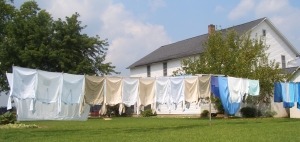
But as Amish learn in these types of cases, you can only live so far apart. It turns out that a caller tipped off the Ohio Department of Health to the Hardin County Amish situation.
The type of regulatory issues Amish deal with depends on how close they are to mass society. Mainstream to progressive Amish settlements tend to have concerns more aligned with those of mainstream culture.
As an English person I can more easily sympathize with my Lancaster Amish friend who has to put up with onerous food inspection rules and whose taxi drivers have to have their ducks in a row with the state. These concerns are more like those of English business owners who deal with keeping government officials happy.
If I had to guess, battling for the right to outhouse freedom is probably not going to be a big winner with the public–especially if they’re grossed out by the apparently venerable practice of human waste being used to fertilize fields (if you were wondering, human-waste-based “biosolids” are apparently widely used by US farmers as fertilizer–though not without controversy).
At the least it might not be worth the bother for these Amish–as Bontrager seems to acknowledge, admitting there is “Probably not much I or the others can do about it, though, I suppose. If there’s a rule, there’s a rule.”
Religion in the outhouse
This isn’t the first time an Amish outhouse struggle has made headlines. A stricter group may be apt to take a stronger stand–and some have. In 2008 Amish in Pennsylvania raised a stink (story no longer online) objecting to outhouse strictures on religious grounds.
You may be wondering, just how does religion fit in? In the PA case I believe it had to do with the requirement that Amish contract with a sewage hauler to remove waste (with the contract being the objectionable point).
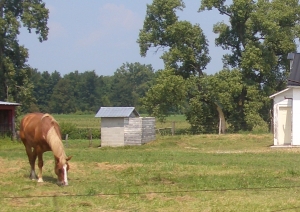
The big consequential Amish clashes such as schooling and military service have hinged on religious issues. But just because the Amish are involved doesn’t mean a religious argument is automatically involved.
It seems you could take things to an extreme–that any law that in some way burdens your lifestyle can be counted as an offense to your religion.
To be frank, Bishop Elmer’s complaints sound more like those of a irked libertarian than those of a religiously-concerned Amish person. Not that there’s anything wrong with an American citizen protesting from that standpoint (though a case could be made that Amish by their own beliefs perhaps should not). However, down the line it could backfire, especially if Amish burn away collective public sympathy.
But giving it more thought, maybe this is really just one more salvo in an ongoing war of attrition on Amish life? Coupled with the crackdown on food sales, the Kenton Amish may be feeling that way.
And it turns out there are more requirements coming along with the outhouse rule. Amish will now have to install “a septic system or approved leach bed to properly dispose of the wastewater generated — from laundry, bathing and the like — in each new Amish house.”
One Hardin County Amish woman is described as “see[ing] it as a steady and persistent attack on the Amish way of life.” What do you think?
[poll id=”6″]




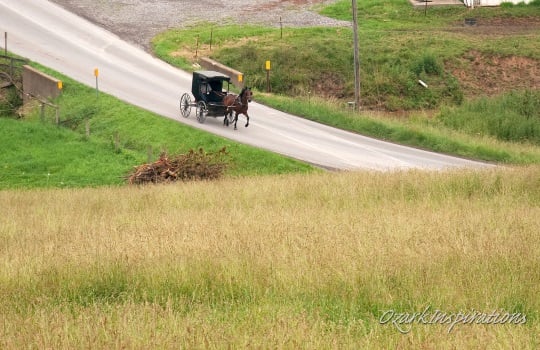
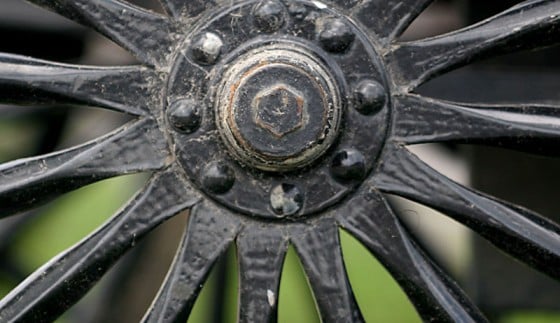
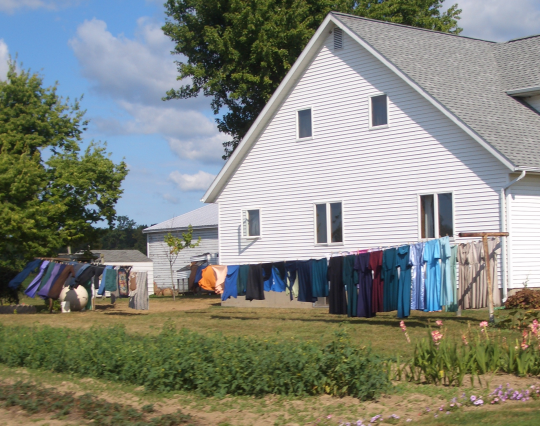
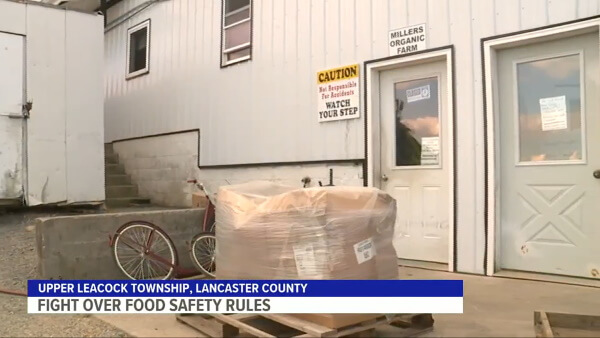
Outhouse Monday, Erik i love it even though i think you may have lost your mind,lol. But seriously I’m not too crazy about someone spreading their own %#@& into the crops that they are growing for maybe me to eat, but now that I’m talking about %#@& lets talk about the government a little here. I’m all for the concept of rules folks and we need some kind of standards to operate as a society, but when it comes to starting a business the government i feel makes it way too hard to even start one because of all the hoops that you have to jump through. And then if your even lucky to make it past that first step you have all those mountain’s of regulations waiting for you when or if you even get there, Now to me that’s really a lot of &%@* if you ask me. And in the end the only one really spreading any &%#* at times is the government themselves, and that truly is a shame because we are a great country. That’s my 2 cents anyway. Richard
Richard–glad I had my #@%!-blocker turned on for your comment 🙂
Good morning Erik and no need to censor my comments as i did that myself on your family friendly site, and its nice trying to have a little fun especially on a Monday. Enjoy your day folks. Richard
I know you did, just kidding Richard. And it’s not exactly a savory topic, but I wasn’t aware that human fertilizer was used until digging around while writing this post. You learn something new every day, though it may be better to stay ignorant on certain topics 😉
I am a privy advocate. It would more more sense for the government to provide help in establishing good composting practice for outhouses than forcing people to pay for updating into concrete tanks and hiring a sewage hauler. I see a windfall potential for some politician’s friends. A properly composting outhouse will not harbor pathogens. A concrete holding tank most certainly will, and then those bio-solids have to go somewhere. Spreading composted bio-solids on fields is, in fact, a better way to recycle them than to pump them out and take them to a processing facility.
Magdalena I did wonder why the requirement exists–is there a true health hazard or are we as a society just squeamish about the whole idea of outhouses? It seems like there ought to be a self-contained alternative, sounds like that is what you are talking about.
Good privy management is not rocket science. The usual problem is that they containment space is too small for the volume of usage, so there isn’t good composting. Compost accelerants are available, and the other solution is to move the privy. Dig a new hole and back-fill the old hole. I used to put a shovelful of leaf-mould down the privy once a week. Properly sited, the privy should not be a source of contaminants. In other words, it should be downhill from your well. Let me see if I can find a link to a blog post I wrote a few years ago.
Blog Post on Privy Maintenance at Anglican, Plain
http://magdalenaperks.wordpress.com/2009/06/13/a-mere-whimsical-aside/
Here is the link.
Amish to government. Outta my ouhouse!
My uncle who is not Amish had an outhouse on his farm until he did it over and had indoor plumbing put in. There are still some farms around here that have outhouses and use them. Some farms around where I live don’t have indoor plumbing. I deliver Meals on Wheels and went into one house that had no indoor plubming and no electric-they were not Amish. If they are going after the Amish, they should go after other non-Amish farms that are doing the same thing. In fact our local Historic Society had a calendar one year of outhouses. A different outhouse each month. I know a lot of the outhouses still stand and aren’t used-but some of them still area in New York State.
Wow!
Erik I had no idea! It’s one thing for animal waste to be spread, but HUMAN WASTE!?!?!?! And I’m lost did I read correctly?? The Amish are not the only ones who spread human waste (I never even heard of this), other big time farms do also??? Gross! Yuck! Nasty! Wonder if this could cause anything to our health 🙁
Happy #@%!ty Monday 🙂
Biosolid fertilizer usage
Yes it was new info to me too Rachel. But it’s definitely not just the Amish, though while the Amish may use raw waste, the farming industry is using it in processed form. The 2009 story I linked above says 4 million dry tons of biosolids would be used that year by US farmers.
I’m sure readers better-acquainted with the industry can shed more light on both safety as well as how much that 4 million is compared to the total fertilizer usage, but it doesn’t sound like a small amount to me as a layman.
It’s funny how we accept animal-source fertilizer but get squeamish about the human kind (I’ll admit I am in that boat too).
Okay, I have to have lunch soon so I better take a break from this topic for a little while 🙂
This we learned on a tour: At the waste treatment plants, the solid waste is separated from the liquid waste. The solids are chemically treated to kill the most threatening bacteria (like e coli), and then shipped away and sold to farm operations. The liquids are likewise treated, then returned to the local creek/river.
As a kid, we used to dig around in the pasture where the waste ran off from the outhouse. The worms could be found in amazing abundance. Then we’d spend the afternoon fishing. Good ole days.
My mom’s 77 and by the time she was five, one of her chores was to empty the chamber pots into the horse pasture each morning (if it wasn’t frozen; then she could dump them in the privy). They were among the later middle class families in town to get indoor plumbing (my grandfather was the long time Town Clerk & Treasurer).
Nothing wrong with spreading human manure on pasture, hay, and other field crops. Air and sunshine are two of the best disinfectants ever created. I wouldn’t advocate doing so on fruit and vegetable fields during the season you harvest them for human consumption.
“Bio Solids” coming from the cities have other problems — you have accumulations of heavy metals and drugs in the material. That’s a far different and more dangerous issue then Amish families spreading their own waste.
As with any manure, you should have good management practices when it’s spread, and also good “traps” along waterways to prevent run-off.
A lot of a farmland is tiled and ditched to rapidly shed water (so you can plant earlier in the spring and roots go down deep during the spring growing season…if they only set shallow roots due to a high water table in spring, they don’t have roots deep enough for to reach moisture in the dog days of summer). A lot of farmland is also ditch-to-ditch cultivated so you don’t have grass and brush to slow runoff and catch pollutants (think how beautiful Lancaster County looks; but that directly contributes to runoff polluting nutrients into the Chesapeake).
As long as we’re talking farms and hamlets, well maintained outhouses are a VERY minor concern.
Poopy
It seems we recycle things, all things,in one way shape or form. I did not know human waste was put on pasture fields and gardens and such. We use the horse manure on flower beds and in our vegetable garden. But never thought about human waste.I have been in many Amish homes, I live among the Amish here in Glen NY. I have never asked any of my neighbors if it is general practice to use our waste on fields and the like. The community here is Old Order Amish I do not feel it correct to impose our English way of life on to the Amish. They are who they are old fashioned and if they chose that so be it!!!!
Amish to go
Couldn’t the outhouse waste be buried in the field instead of spread on the crops?
Is there any disadvantage of re-using laundry wastewater for watering the grass and trees, if there’s no bleach in the water? Maybe it would have to be cooled in a tank or drum first.
Back in the outhouse generation, did everyone use outhouses, or just country folks? Then it went to septic tanks, and now a lot of places are connected to sewer systems.
Should septic tanks and outhouses be 50 feet or more away from a well?
This is stupid! If the spot light wouldn’t be turned onto the Amish. Everything is Amish this, and Amish that from Romance Novels to Beard cutting, from Amish Tours to Amish Outhouses. Everyone is after the Amish, either to make them faultless and they can’t do anything wrong, to finding fault with their outhouses. Makes me wonder what is next on the list…
Oh, it looks like we are very divorced form our rural past… I would suggest google search for some of these questions. The biggest issue is contamination by e. coli, but this is also a major problem with using animal wastes. Good composting gets hot enough,long enough, to kill pathogens.
Personally I am in favor of government sanitation rules.
Third world countries have some pretty nasty diseases affecting people where there is poor water and sanitation control. I think the Amish “religious” right stops where my clean water and protection from sewage contamination begins…….
Population density is a huge factor.
Traditionally managed outhouses aren’t appropriate for moderately or greater populated areas — third or first world. Villages, towns, cities, etc.
(Though even in those areas you could use modern composting toilets effectively and safely).
However, in significantly lower population densities such as farms or small hamlets or cross-roads of a few houses…using properly built, maintained privies with good separation from well built wells it shouldn’t be an issue — except to one-size-fits-all bureaucrats blindly enforcing prescriptive rules instead of understanding the why behind those rules and using performance based standards.
I guess I’m a little sensitive on the issue because I live in a mostly rural area where a lot of people don’t belief that even burning their garbage hurts their neighbor–“it just disappears into smoke in the air”.
We all have septic tanks in this area, but just down the road lots of farms have….whatever they want to, I guess. We certainly have plenty of manure spreaders fanning out from a couple of big dairy farms, so I’m quite used to that. But I do think that we need the oversight and regulation of the septic tanks where we live closer to each other in town.
Amish to government-: Outta my outhouse
A few yrs ago, here in the south, human waste was distributed in a powdery(dry) form and was experimentally used on hay and farm crops. I don’t know if there was enough benefit, compared to the cost per acre, but it isn’t used in our area anymore.
I'm on here during a break
I’m on here during a break, and Erik I must say that I never knew so much about $&*@ until I read today’s post,lol. Now id better get the #&*@ out of here and get back to work! Richard
Outhouses
I am with Magdalena. Properly composted waste, human or other animal, is free from harmful bacteria. Saying that human waste is spread on crops brings to mind a quite disgusting image but I have seen, and smelled, the composted product and it is not disgusting at all. Allowing the waste to compost in properly placed outhouses is a much safer practice than requiring people to handle the raw waste, haul it across public roads and dispose of it in a mass possessing facility. There are so many points at which something can go wrong in that practice.
I can see the point in requiring indoor plumbing in heavily populated areas but not in rural farming areas. I think some of these agricultural laws are made by people who lived their entire lives in urban environments and are out of touch with the nature of life itself. As a customer once said, “Some people have been off the farm too long.”
This is not just an Amish issue. People on farms and ranches all over the country are facing similar situations. Our food does not come from the grocery store, it comes from farms and ranches. Food safety is important but so is the ability of our food producers to stay in business. Government regulations need to be based on a balance between the two.
Amish and outhouses
I really enjoy the Amish and their hand crafts. But on this one, I feel it is a health issue. I am a nurse and infection controll can prevent a lot of bacterial infections. Wast seeps into the soil and can contaminate water and soil, not just of Amish but their neighbors. So I do feel it is wise to have a holding tank that can be emptied by a sewage disposal company. Maybe years ago it wasn’t necessary, but now with Amish living so close to their English neighbors we are more populated now and sewage can cause bacterial problems. Sorry but this one is true.
Wow Erik you have quite a bit of comments from this outhouse post, I may have to now start a new blog thats only about outhouse’s. Its an untapped market and I’m going for it baby! Richard
Richard that just may be a nice untapped readership for you, and as you see we have something to say on the topic!
And I found this funny: I spoke with an Amish friend yesterday who had viewed this post. He said he was surprised so many English have outhouse experience. He is a non-outhouser, himself, as you’d probably guess 🙂
There is a book called THE HUMANURE HANDBOOK, a guide to composting human manure.
It's called common sense ....
If human waste is properly handled, it is not a problem. Most outhouses here in the US will not pose a problem because the waste is in a hole and dogs and pigs cant get into it.
Not so in some countries, like Bolivia. I ended up with hepatitis when we lived there, and so came to appreciate some government regulation. Yeah, we overdo it up here in the US in my opinion. When we lived in Ohio a couple of years ago, the State was going to make a statewide law that every new home had to put in the new mound septic systems, to the tune of about $15,000 to 20,000 per house (compared to about $3000 to 5000 at the current standards) if I remember right. When too many people complained they backed off and I dont know where it stands today.
It may seem strange to some city folks who arent used to a manure pile 20′ in diameter and 5′ tall only a good stone’s throw from their front door, like I have it here 🙂 but 3rd world development folks actually encourage and teach how to use human waste for better farm crops in poor countries. An example is this book (this may not be geared toward developing countries, but I have seen some that are):
http://books.google.com/books/about/Future_fertility.html?id=5Q5IAAAAYAAJ
Mike
Fun(?) with Statistics:
Hardin County, OH.
Humans: 32,000 (about the same as in 1900, and up from 27,000 in 1940).
Cows: 15,000
Hogs: 55,000
Chickens: 10 Million (conservative guesstimate; USDA doesn’t give an exact figure since they’re located at only a few really big farms).
There’s a rule-of-thumb called “Animal Units” used to compare the relative impact between species.
Converting the above into AUs we get:
Chickens: 40,000AU
Hogs: 6,100AU
Cows: 18,000AU
Humans: 5,500AU
In other words, people poo is the least of your worries 🙂
Like I’ve said in my other posts, density matters. I just don’t see in a predominantly small farm rural community there being a worry about contaminating wells other then on the farmsteads themselves (and that can be prevented by good practices there). The amount of chicken, hog, and cow manure being spread on top of the soil far outweighs what the people are doing!
Googling a bit more, it’s actually even a bit more dramatic; looking a bit more 1/4 of the people live in the city of Kenton which has a sewer system.
Then consider only 200 Amish families live in the county, that’s under 360 AUs worth of outhouse users.
I have no problem if the issue was the Amish who might live in Kenton itself, with a population density high enough to mandate tying to the city sewer system (or the dump-and-pump scheme proposed). But not out in the countryside where the farm animals pose a far, far, vastly greater risk.
Interesting way to look at it Matt, thanks. Plus I learned that I am equal to about 1/6 of an Animal Unit (or maybe less living in town) 🙂
Thanks so much for posting the info, you really seem to be able to find the info for this, Matt!
Being that I contracted hepatitis A from an unknown source, I view this with a desire to have people take greater care in dealing with human waste. Yes, government is intrusive, but hepatitis put me out of commission for a long time. My liver seems to have never fully recovered as I have liver function tests yearly. All because someone was careless with human waste one time. Not worth it in my opinion.
“Night soils” were ubiqutous in China prior to the 1960’s, even collected in cities, and are still used today in some rural parts.
Some Americans in the “deep Green” environmental movement might think human manure is earthy, natural green, etc.
My hunch is that this is OK on a small farm but diffficult to “scale up” without running into problems. And as others have implied, using night soil safely is not quite as simple as shoveling waste onto cropland.
I don’t think a ‘law enforcement’ mentality is the best or most effective way to deal with this problem. The issue of human waste is certainly not something that can be eradicated or fought like crime. Better to use outreach/education on the matter, and for rural landowners to cooperate with each other to clean the environment.
George Washington used poo...
Erik,
Before moving to OK, my family visited Mt. Vernon–the home of President George Washington. While on the tour, we learned that President Washington used human fecal matter on his fields. In fact, we were surprised to see the outhouses-one for men, the other for women, each had four holes for you to do your business–none with seperation for privacy. His outhouses were built upon a slight hill, and at the bottom of the hill (around on the backside), you could find the “drawers” the workers pulled out to empty the waste. These outhouses were less than a stone’s throw from a gate that lead directly into the fields.
When I first found out Pres. Washington used human poo on his fields I was pretty grossed out. But the more I thought about it, the less it bothered me. During Pres. Washington’s time, there were less medicines/drugs one could put into their systems, and their diets were much more rounded than most of ours today are. With that in mind, I don’t mind if someone wanted to use human poo on their fields. Repeated exposure to the sun and elements of nature would kill any ickies that might be there. Not to mention the amount of poo per acre is so miniscule, I can’t imagine it creating any issues. Animals way out number humans on earth, and yet we don’t think anything about planting in our yards where animals do their business all the time. Why should this bother us?
Sewers aren't modern technology
First off let me say this…….. I grew up in a community in Ohio that has a large Mennonite population. This is not Amish but I still have great respect for the faith of those who choose to live that way. With that being said I must put the argument out for why the Amish can be required to do this. Amish can not be required to do anything that forces them to use a modern technology. But sewers are not a modern technology at all. Sewers are older than the Amish, Christianity even Christ himself. The Romans who killed Jesus in Jerusalem lived in a city that has sewer systems. They worshiped a goddess named Cloacina who was the protector of underground waterways including the sewage system. While the Amish shouldn’t be forced to use modern technologies they can be required to use sewage systems because there is nothing modern about them. It is not something that runs afoul of their individual faiths.
Evidently your Christ is not the same as he for whom a body was prepared, who took on the seed of Abraham, “which Seed was Christ,” the power and wisdom of God, who was before your world was and before all proud flesh and high minded ones who forgot what they are, and are swelling up with that serpent like wisdom that has made the world like a wilderness, and given birth to snakes and scorpions, and so man bites and devours one another for self ends, seeking your own like the beasts that perish, and yet will you cry peace though it be far from your lusts and pleasures that war in your members: and set you one against another when you have not your ends.
one other thing........
The problem isn’t it being spread on their fields its that the waste leaks through the ground into public watersheds and aquifers. That contaminates water that everyone drinks, possibly for miles around not just the Amish citizens one a single property. Treating this contaminated water costs taxpayers a lot of money. So it isn’t just about their freedoms its about other peoples safety. But what would I know…… I’m just from a partially Mennonite community and spent the last 2 years studying for my Ohio water and wastewater treatment licenses.
amish waste
The Amish don’t waste anything, first and foremost, they eat clean food for the most part ( many use fertilizers and sprays ) and they are definately eating far better and cleaner food than the cows that are raised across America. If you see what most cows are fed and the shots they are given and the WRONG diet they are supplied, the waste from Amish is by far cleaner and healthier than the cow dung used on YOUR food now. Need to know the facts before you jump on their choses of lifestyle.
Human waste from clean diets far outweighs cow waste from unhealthy cow diets.
Grass fed beef waste is a much better choise than corn fed beef waste.
Amish need to be left alone…
Best Odor Removal Services Peoria
Come at Arrowhead Pooper Scoopers in Peoria AZ, providing the Best Odor Removal Services in Peoria. Our full-service pet waste removal company is here for your all pet waste needs.
https://www.arrowheadscoopers.com/services/